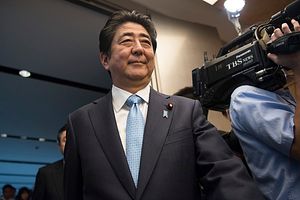Japanese Prime Minister Shinzo Abe was originally expected to announce his bid for re-election as president of the ruling Liberal Democratic Party (LDP) on July 22, when the Diet session ended for the summer. However, due to the torrential rains that affected western Japan, he postponed his announcement. He is now expected to announce sometime in August, possibly on August 11 at a meeting of the party’s chapter in Yamaguchi prefecture, his home prefecture. If he wins this internal party election, Abe will serve for three consecutive terms and become Japan’s longest-serving prime minister.
Abe’s position was strengthened when Fumio Kishida, policy affairs chief of the LDP, announced on July 24 that he would not run against him. Kishida previously served as Japan’s foreign minister, and was known for his more dovish views, especially in contrast to Abe’s hawkishness. Kishida deferred to Abe’s camp for a variety of reasons, including the need to focus on dealing with the aftermath of the rains that affected Kishida’s home prefecture of Hiroshima; the importance of government stability during this period of tension with the United States and North Korea; and the Upper House elections next summer. The decision was also likely made based on the calculation that Kishida will have a better chance at the party presidency in the future than in this cycle.
Though Seiko Noda – the minister for internal affairs and communications as well as minister in charge of women’s empowerment – has expressed interest, she has not garnered enough support to even run yet. That means the race is likely to come down to Abe and former defense minister Shigeru Ishiba.
Ishiba ran against Abe once before, in 2012. Abe’s victory that September paved the way for his premiership when the LDP returned to power in December.
Ishiba has commented that if he runs he will raise objections to the status quo. If he offers policy alternatives to Abe, on issues from security and diplomacy to social security and party governance, that debate in and of itself would be healthy for Japan. Since Abe ran unopposed in the last leadership race in September 2015, it has been six years since there was a policy debate with real stakes within the ruling LDP.
Though Ishiba has not announced a bid yet, saying he needs more time to prepare campaign pledges, he has been vigorously visiting rural communities, trying to drum up support among the party’s rank-and-file members.
For the first time this year, Diet members and local chapters have equal say. Local chapters used to only have 300 votes, but now they have 405 votes, as do Diet members. But the privileged position of the Diet is maintained: if no candidate wins an outright majority in the first round, Diet members still have 405 votes in the run off between the top two, but local chapters will only have 47 (one per prefecture).
While Abe might try to focus on the constitution – presenting his version of constitutional revision as more pragmatic than Ishiba’s – the two will have cater to local concerns because of this rule change. Those concerns include addressing major infrastructure and transportation needs (i.e. “pork”) as well as offering support for farmers who may be affected by the Trans-Pacific Partnership and helicopters for medical evacuation of those living in isolated rural communities.
In another sign of the party’s democratization, the LDP is also considering extending the right to vote in party leadership races to 18- and 19-year-olds who have paid their dues since the nation lowered the voting age to 18.
According to a poll by Kyodo News released on July 29, approximately three-quarters of LDP Diet members back Abe for a third term – 310 out of 405, to be exact. LDP members appear to believe in the importance of maintaining stability, and have faith in Abe’s ability to deal with both the United States and North Korea during these trying times. Though, theoretically, there is still the possibility of power shifts, Abe is in a very comfortable position.
Abe’s greatest weakness will likely be the continued impotence of “Abenomics” and a series of cronyism scandals, the Moritomo Gakuen and Kake Gakuen scandals. These latter two issues, even if dormant in this leadership race, could become a campaign issue again next summer in the Upper House election.
The race for LDP president is expected to officially start on September 7, with the vote being taken on September 20. The election must be held by September 30, when Abe’s second term ends.

































